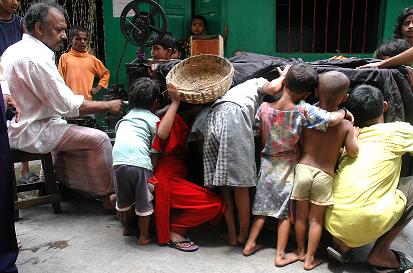
When the sun sets on the grimy backstreets of this crowded, crumbling city, Mohammad Salim begins cranking his century-old machine and calling out to the children.
"Come over, come over. The show is about to begin," Salim hollers as dozens of bedraggled boys and girls crowd around his coffin-shaped cart that hides in its belly a world of cinema far removed from the razzmatazz of swanky multiplexes.
For thousands of children in the squalid slums of central Kolkata, Salim's mobile theatre cart -- a wonder machine run by a 107-year-old Japanese projector -- is often their first introduction to the celluloid world at a price that wouldn't buy half a piece of bread in most western countries.
"For 50 paise only, I show children films that have dialogues, dance, music and fighting. They simply love it and keep coming back for more," Salim, 52, told rediff.com as he turned the crank of his antique projector.
The machine
Salim's creaky, clattering cart, around six-feet-long, has in its innards a 15-inch yellowing, patchy screen on which a Japanese projector, marked 1898, throws random clips from Bollywood musicals. The images are blurry and the sound hoarse.
The projector, mounted at one end of the cart, throws the images into a rectangular metal box, and finally on to the screen. There are only a couple of these antique machines in India.
And what Salim calls his movies are actually random clips that he glues together from film scraps bought by the kilogram from recyclers. "I look for clips with dance and fights."
Viewing comfort is non-existent, with up to a dozen children hanging on to the wooden cart from its sides, watching through a slot. A thick black cloth hangs over their heads blocking out the light.
Celluloid joys
Salim's customers, mostly 5-12 year olds, don't mind the inconveniences.
"I love to see films with my friends on this machine,' says Munna Akhtar, a scrawny, half-naked little boy with runny nose, who, like his friends, calls the mobile theatre 'the machine'.
The children also don't mind that what they watch are just haphazard clips from old films so long as they have their staple of dance, music and fights.
And for most of them, it's also about the freedom of spending a little money they get from their poor parents.
"I haven't increased my price for many, many years simply because then the children can't afford to pay more," says Salim. "I'm also satisfied that I can bring 10 minutes of joy in the lives of these children."
Family Business
The business of bringing joy into the lives of these children is something Salim's father started several decades ago when he began showing films on the streets of Calcutta with the same Japanese projector he bought from a Calcutta elite.
"I used to help my father with pushing the cart and also the machine," says Salim, reminiscing about the time when he fell in love with the mobile theatre.
"I knew from then that I would show films like my father. Today, it's not only a source of income, but it also reminds me of my childhood," says Salim, who makes about one hundred rupees on a good day.
Now Salim's two sons help him. They look forward to taking over from him someday.
But the sons are a few degrees less romantic about the machine as compared to their father.
"I want to run a shop. But if I can't do that, I will get into this," says Jasin, Salim's 14-year-old son, who dropped out of school to work in an embroidery factory for a little extra money.
In a country that churns out some 800 films every year, Salim's love affair with films runs beyond his machine. "I love watching films on television, but I have little time for it."
Every night after Salim returns home tired from pushing his cart around, sometimes up to 20 kilometres in an evening, he sits down to sift through his film clips looking for the most jaded prints.
He then sells these to film recyclers who cut the clips into small frames, usually mug shots of the heroes and heroines, to be fitted into binocular-like toys for children.






 © 2025
© 2025